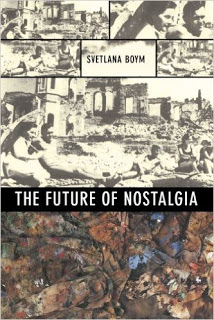
Margalit Fox's Times obituary of Svetlana Boym, the Curt Hugo Reisinger professor of Slavic languages and literatures and comparative literature at Harvard ("Svetlana Boym, 56, Scholar of Myth and Memory Dies, NYT, 8/22/13) discusses one of her works, The Future of Nostalgia. Fox writes, "
Throughout the book, Dr. Boym grappled with two essential questions. Can a past that has slipped out of reach be reclaimed by means of nostalgia? Should it ever be?"
Fox goes on to elaborate on two kinds of nostalgia that Boym identifies, "one salubrious" and affording consolation and one dangerous in its attempts to be "restorative." Fox quotes Boym about the latter case to the effect that,
"This kind of nostalgia characterizes national and nationalist revivals all over the world, which engage in the anti-modern mythmaking of history by means of a return to national symbols and myths."
Thus one type of nostalgia for the past might result in works art like Joseph Roth's The Radetzky March and Stefan Zweig's Beware of Pity and the other the other the treatment of historical wounds by the excavation and elevation of the Swastika. A similar tendency infused the Serbian crusade for ethnic cleansing in Bosnia and in particular the siege of Sarajevo, a city of both historic and mythic significance for both Bosnians and Serbs. The same might be said of the slaughter of Tutsi by Hutus and of Shiites by Sunnis (and the reverse) and of Armenians by Turks to name only a few modern holocausts. Boym's fascinating obit describes a deracinated existence which must have provided the existential experience for the creation of her theories and her premature demise only adds a bittersweet ending to a dramatic story of survival in the Soviet era. The brilliantly oxymoronic title of the book epitomizes the historical conundrum that Boym explores. And what is fascinating is how unclear the divide is between the two forms of memory that Boym underscores. At what point is melancholy turned into militant idealization? When does the reliving of the past, with its litany of depredations, turn into a crusade against imagined slights that have no real relation to present reality and life?
{This was originally posted to The Screaming Pope, Francis Levy's blog of rants and reactions to contemporary politics, art and culture}